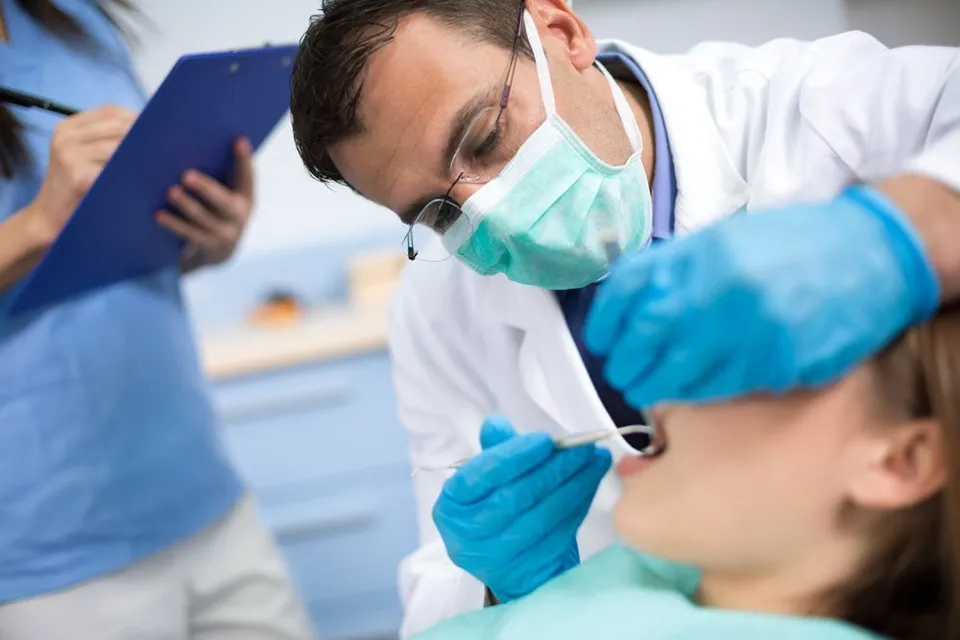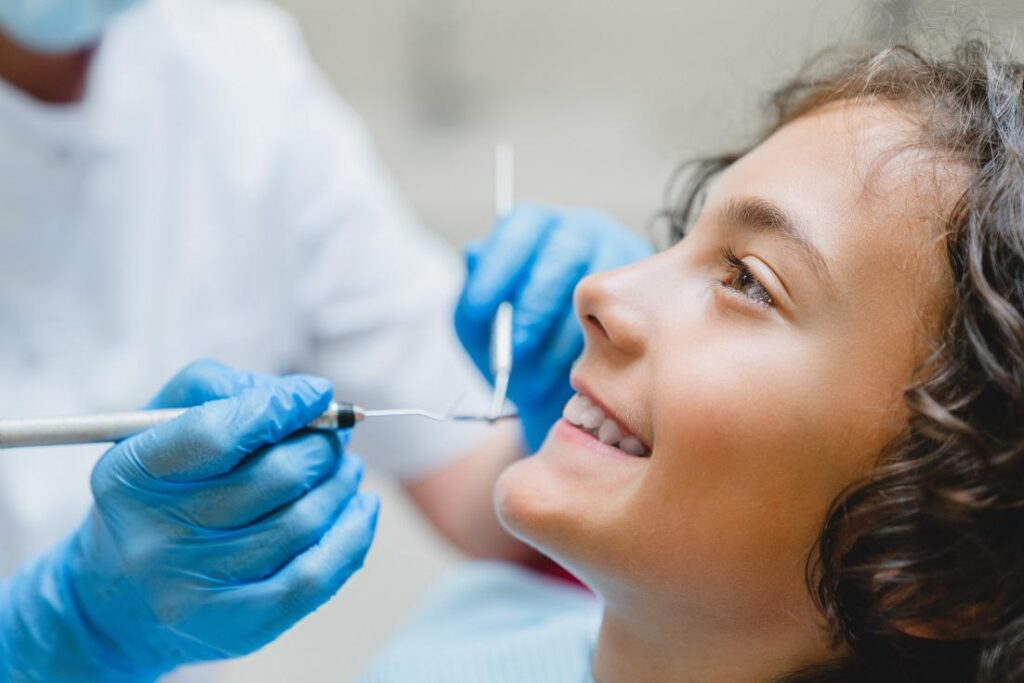Determining whether dentistry is harder than medicine is subjective and depends on individual preferences and strengths. Both professions require rigorous education, dedication, and continuous learning. Dentistry emphasizes oral health with precise skills, while medicine encompasses a broader understanding of the human body.
Moreover, dentists often have a more immediate impact on patients and can enjoy a better work-life balance. But they deal with a specific area. Medicine involves a longer training period, diverse specializations, and the potential for more extensive responsibilities.
Ultimately, the difficulty is a matter of personal perspective and which field aligns better with one’s interests and abilities.
What Are The Pros Of Medical And Dental Careers?

| Medical | Dentistry |
| Various specialties (e.g., surgery, internal medicine, pediatrics) | Specializations such as orthodontics, endodontics, oral surgery |
| Generally shorter residency compared to other medical specialties | Shorter training period (5-7 years) with internship and residency |
| Opportunities for clinical research and medical innovation | Opportunities for dental research and technological advancements |
| High earning potential after completing residency | Potential for high earnings upon establishing a practice or joining a clinic |
| Encounter diverse medical conditions and patient demographics | Treat diverse dental cases and conditions, ranging from routine to complex |
| Opportunities in private clinics, hospitals, and practices | Potential to establish private practices or join existing ones |
| Opportunities for medical missions, global health initiatives | Participation in dental outreach programs, international dental relief efforts |
| Varied work schedules; challenging to achieve work-life balance during residency | Potential for more structured work hours; work-life balance can vary |
| Specializations like neurosurgery, cardiology, and orthopedic surgery can lead to high earnings | Specializations such as orthodontics, oral surgery, and prosthodontics can offer high earning potential |
What Are The Cons Of Medical And Dental Careers?
| Medical | Dentistry |
| Lengthy training (7-15 years) including residency | Lengthy training period (5-7 years) with residency |
| The narrower range of specialized fields compared to other healthcare professions | Focus on oral health; limited to dental specialties |
| Rigorous residency programs requiring long hours, high workload, and little time off | Intensive clinical training with demanding schedules |
| Less emphasis on research compared to academic medicine or other scientific disciplines | Limited opportunities for extensive research |
| High-pressure environments and demanding patient care responsibilities can lead to stress and burnout | High-stress environments with patient care demands |
| Income is tied to patient volume, which can fluctuate and lead to financial instability | Reliance on patient numbers for practice income |
| Difficulty achieving work-life balance due to demanding schedules and on-call responsibilities | Work-life balance challenges due to practice demands |
| Focus primarily on individual patient care, with less exposure to broader public health concerns | Limited exposure to broader systemic health issues |
| Navigating complex healthcare regulations and administrative tasks can be time-consuming | Dealing with regulatory and administrative burdens |
Dental School vs. Medical School
Dental School vs. Medical School encompasses differences in curriculum, career paths, and clinical focuses.
Similarities in University-Level Education
At the university level, dentistry and medicine share similarities as rigorous disciplines, demanding profound comprehension of fundamental sciences.
Both fields emphasize practical study, requiring dedication from aspiring professionals due to their significant curriculum components.
Length of Studies Dentistry (six years) vs. Medicine
Length of Studies in Dentistry
The path to becoming a fully-qualified dentist typically involves:
- Five-year dentistry degree
- 12-month dental foundation training
- A minimum of 250 hours of Continuing Professional Development (CPD) training every five years.
Length of Studies in Medicine
Becoming a doctor entails:
- Five-year medicine degree
- Two-year foundation training
- Additional 5 years (or more) of specialist training, varying by specialty.
Note: Graduate Entry pathways exist, potentially expediting both processes.
Consideration of Training Duration
When contemplating the choice between dentistry and medicine, the duration of training becomes a crucial factor. Dentistry presents a shorter path, which appeals to those averse to the longer training period needed for becoming a doctor.
Individual Suitability
The decade-long training process to become a doctor can not align with everyone’s preferences or circumstances. Therefore, understanding one’s aptitude and willingness for the duration of training is pivotal in making an informed decision between the two professions.
Entry Requirements for Dentistry vs. Medicine
Entry requirements for dentistry and medicine vary, reflecting the distinct nature of each profession.
Similarities in Entry Requirements
Gaining admission to dental or medical courses shares notable similarities, yet the entry requirements for medicine are often perceived as more challenging. Both fields demand a robust academic foundation and a combination of standardized testing and non-academic criteria.
Entry Requirements for Medicine
Prospective medical students typically need:
- Five GCSEs at A* or A level (including English and maths).
- Three A levels at AAA or AAB, with a focus on chemistry and/or biology, along with mathematics or physics. Additionally, two further highers can be required.
- A competitive score in a medical admissions test (UCAT or BMAT).
- An impactful personal statement showcasing motivation and suitability for the medical profession.
Entry Requirements for Dentistry
Aspiring dental students generally require:
- Five GCSE passes, encompassing Science, Maths, and English.
- Three A levels at AAA or AAB, with a specific emphasis on chemistry and biology. An additional subject is typically required.
- Attainment of a good UCAT score, varying based on the specific institutions applied to.
Distinguishing Factors
The notable difference lies in the focus on A-level subjects, whereas medicine often requires a broader range, including physics or mathematics. Additionally, the medical admissions test is emphasized in medicine, contributing to its reputation for more stringent entry requirements
Earnings of Doctors & Dentists
The earnings of doctors and dentists can vary based on factors such as specialization, location, experience, and type of practice:
Financial Considerations
An essential aspect to ponder when deciding between dentistry and medicine is the financial aspect. In terms of lifetime earning potential, dentistry emerges as the more lucrative profession. This is primarily attributed to shorter training periods and earlier entry into the workforce.
Factors Contributing to Dentistry’s Financial Edge
- Immediate Earning Potential: Dentists commence earning as soon as they qualify, providing an early start compared to doctors who can spend additional years in training before earning a full salary.
- Private Sector Opportunities: Dentistry offers greater scope for private sector work earlier in one’s career, often with more lucrative financial prospects compared to public sector roles.
- Income Range in the NHS for Dentists: NHS dentists can earn between £38,000 to £110,000 annually, depending on their work location and experience.
- Private Dentists (Business Owners): Private dentists, particularly those who own their practices, can potentially earn £130,000 or more per year.
Earnings of Doctors (Source: NHS Careers)
- Foundation Year Doctors: Earn between £28,000 to £32,000 in the first two years post-graduation.
- Specialist Trainees: Make between £37,000 to £48,000 annually.
- Consultant Doctors: Annual earnings range between £78,000 to £105,000 per year.
Consideration of Private Sector Involvement
Many consultant doctors also engage in private sector work, narrowing the gap in potential earnings between dentistry and medicine. However, dentistry can still hold a slight edge when comparing overall financial prospects.
Average Costs/Tuition Fees for Medicine
- Home Fees: £9,250 per year for students with 3 years of residency before the course starts.
- International Fees: Range from £41,195 to £67,194 per year, depending on the university and program.
Average Costs/Tuition Fees for Dentistry
- Home Fees: Vary from £9,250 to £28,900 annually, depending on the university, with potential additional costs for postgraduate courses.
- International Fees: Range from £23,900 to £67,194 per year, depending on the university and program.
Skills Required for a Career in Medicine
Skills required for a career in medicine encompass a blend of technical expertise, interpersonal abilities, and intellectual acumen:
Communication Skills
Effective communication is vital for conveying complex medical information to patients, collaborating with colleagues, and ensuring proper understanding and compliance.
Empathy and Compassion
They are essential qualities for doctors to cultivate as they interact with patients. A compassionate and empathetic approach fosters trust between doctors and patients, creating a supportive environment where patients feel understood and valued.
By actively listening to patients’ concerns, acknowledging their emotions, and demonstrating genuine care and concern. They can establish strong therapeutic relationships that enhance patient satisfaction and compliance with treatment plans.
Furthermore, empathy enables doctors to provide emotional support to patients facing challenging medical conditions or difficult treatment decisions. It helps them navigate their healthcare journey with greater resilience and confidence.
Decision-Making Skills
They must make critical decisions under pressure, weighing risks and benefits to determine the most suitable course of action for patient care.
Teamwork and Collaboration
Collaborating with nurses, other healthcare professionals, and support staff is essential for delivering comprehensive patient care in a multidisciplinary environment.
Ethical Judgment
Doctors must make decisions aligned with strong ethical principles, ensuring they respect patient rights like autonomy and confidentiality. This means they must always consider what’s best for the patient while honoring their choices and keeping their medical information private and secure.
Adaptability
In medicine, things are always changing. Doctors need to be flexible and open to learning new technologies, treatments, and research findings. Being adaptable allows them to provide the best possible care by staying up-to-date with the latest advancements in their field.
Time Management
Efficiently managing time is crucial for doctors, as they often juggle multiple responsibilities, including patient care, paperwork, and continuing education.
Skills Required for a Career in Dentistry

Skills required for a career in dentistry encompass a combination of technical proficiency, interpersonal abilities, and professional acumen:
Manual Dexterity
They perform precise and intricate procedures, requiring excellent hand-eye coordination and manual dexterity.
Problem-Solving Skills
Identifying and solving oral health issues through diagnosis and treatment planning requires strong problem-solving abilities.
Attention to Detail
In dentistry, precision is paramount due to the nature of the work, often performed in small and confined spaces. Meticulous attention to detail is crucial not only during procedures but also in record-keeping. They must carefully assess oral conditions, accurately diagnose problems, and execute treatments with precision to ensure optimal outcomes.
Additionally, maintaining detailed and accurate patient records is essential for tracking treatment progress, identifying potential issues, and providing continuity of care.
Whether filling a cavity or performing a complex dental surgery, every step requires careful attention to detail to ensure the best possible results for the patient.
Communication Skills
Effective communication is a cornerstone of quality dental care. Dentists must be able to convey complex information clearly and understandably to patients. This includes explaining diagnoses, treatment options, and preventive care practices in a way that empowers patients to make informed decisions about their oral health.
Further, clear communication helps alleviate patient anxiety, builds trust, and fosters a positive patient-provider relationship. Moreover, dentists must also communicate effectively with other healthcare professionals, dental staff, and laboratory technicians to coordinate care and ensure comprehensive treatment plans.
Empathy and Patient Rapport
Building a strong rapport with patients is essential for successful dental care. Empathy, the ability to understand and share the feelings of others, is key to establishing meaningful connections with patients.
Dentists who demonstrate empathy can better address patient concerns, alleviate fears, and create a supportive environment conducive to open communication. By showing genuine concern for their patient’s well-being and actively listening to their needs and preferences, dentists can foster trust and confidence in the dental care provided.
A positive patient-provider relationship built on empathy and rapport not only enhances patient satisfaction but also improves treatment outcomes and promotes long-term oral health.
Business Management (for Private Practice)
Those running private practices need basic business skills for managing staff, finances, and office operations.
Adaptability
Keeping up with advancements in dental technology and techniques requires a willingness to adapt to changes in the field.
Ethical Judgment
Upholding ethical standards is fundamental for dentists to maintain the trust and well-being of their patients. Patient confidentiality, informed consent, and fair treatment are key pillars of ethical practice in dentistry. Their confidentiality requires dentists to safeguard sensitive information about their patient’s oral health and medical history.
This entails ensuring that patient records are kept secure and only shared with authorized individuals. Informed consent involves fully informing patients about proposed treatments, including risks, benefits, and alternatives, so they can make informed decisions about their care.
Stress Management
Effective stress management is essential for dentists to navigate the demands of a dental practice, especially during challenging procedures. It can be physically and mentally demanding. Stressors such as patient emergencies, complex treatments, and administrative responsibilities can contribute to professional burnout if not managed effectively.
Work-Life Balance in Medicine vs. Dentistry
When comparing the lifestyle after graduation from medical and dental school, dentistry is often perceived as offering a better work-life balance. Dental work is more specialized and typically involves fewer unsociable working hours
A typical dentist can secure a nine-to-five job, providing a more structured schedule. In contrast, doctors, often work long-hour shifts in hospitals. In addition, the expectation for doctors to be available 24/7 contrasts with general dentists, who are rarely required to maintain such constant availability.
However, in medicine, achieving a better work-life balance is possible by specializing in fields like dermatology. These specialties may involve fewer late-night and weekend shifts.
Additionally, a route in medicine that allows for a healthier work-life balance, akin to dentistry is becoming a General Practitioner (GP). GPs often have more predictable schedules, allowing for a more structured and balanced approach to work and personal life.
Ultimately, the decision between medicine and dentistry, regarding work-life balance, relies on individual preferences, career goals, and chosen specialization within each profession.
FAQ’s
Is dentistry one of the hardest?
Yes, dentistry is often considered one of the most challenging fields of study. Entrance into dental programs is highly competitive, with rigorous examinations varying between institutions. Additionally, steep tuition prices contribute to the perception that dentistry is among the most difficult courses to pursue.
What is the hardest year in dentistry?
The second year of dental school is commonly regarded as the hardest year.
Final Words
Determining whether dentistry is harder than medicine is not a straightforward comparison, as both professions come with their challenges and demands. Dentistry involves precise manual skills and a focused scope, allowing for an earlier entry into practice and potential work-life balance.
On the other hand, medicine offers a broader understanding of the human body, diverse specializations, and impactful contributions to overall health. The difficulty ultimately depends on individual strengths, preferences, and career goals.
Further, what can be challenging for one person could be a fulfilling and manageable path for another. Thus, the decision between dentistry and medicine should be based on personal inclination, aptitude, and alignment with one’s long-term aspirations.
